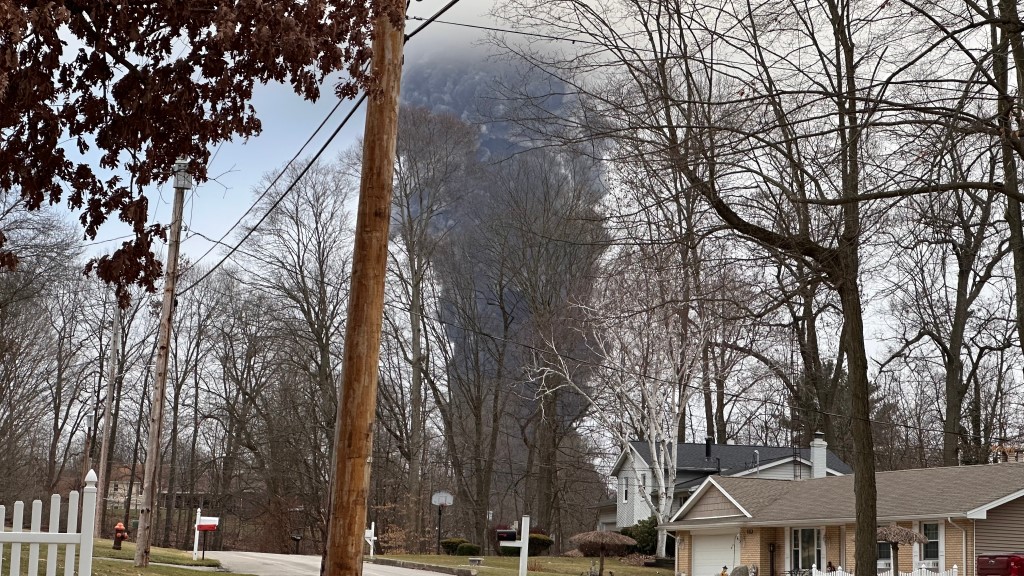Residents’ lives still in limbo a year after East Palestine toxic derailment
- February 14, 2024
- 12:04 pm


Iain Hoey
Share this content
A year following the catastrophic derailment in East Palestine, Ohio, which saw thousands of gallons of hazardous chemicals including the carcinogenic gas vinyl chloride released, residents continue to face uncertainty about the safety of their homes and environment.
The Guardian’s Dharna Noor, in a special edition of the Politics Weekly America podcast, brought to light the ongoing struggles of the local community, despite official reassurances of safety.
Authorities assert safety as residents express doubt
Federal and local officials have declared the area safe from risks posed by surface water, soil, or air contamination following the derailment.
A senior Biden administration official stated: “We’re confident that the residents of East Palestine are not at risk from surface water, soil or air from the derailment.”
Norfolk Southern, the train’s owner, has reportedly committed or invested more than $103m to aid the community’s recovery.
However, many locals remain skeptical, citing inconsistent information regarding the extent of contamination and the availability of aid.
The community’s distress is compounded by feelings of being ignored by officials on matters of both the disaster’s aftermath and the prevention of future incidents.
Varying data and inconsistent communication
Hilary Flint from Enon Valley, Pennsylvania, recounted the onset of unusual symptoms upon returning to her home, which was outside the mandatory evacuation zone.
Despite her requests, the Environmental Protection Agency (EPA) limited its air quality testing to within a one-mile radius of the derailment.
Wayne State University researchers, however, detected compounds associated with the derailment in her home.
Judy Westrick from Wayne State University noted: “I would not expect those compounds to appear on home air filters under normal circumstances.”
Zsuzsa Gyenes and her son experienced acute symptoms on the night of the derailment, leading them to relocate.
Despite assurances of safety, Gyenes remains in temporary accommodation, her decision influenced by ongoing concerns over air quality and her neighbors’ health.
The controlled burn and the path forward
The decision to vent and burn the vinyl chloride shortly after the accident has been a point of contention.
Norfolk Southern’s director of hazardous materials, Robert Wood, defended the measure as necessary, while OxyVinyls, the chemical’s owner, contested the likelihood of an explosion, raising questions about the communication between involved parties.
Advocates and experts warn that without significant policy changes, similar disasters could recur.
Clyde Whitaker, Ohio director of the International Sheet Metal, Air, Rail Transportation union, emphasizes the need for stricter railway regulations to prevent future derailments.
IFSJ comment
The Guardian’s coverage of the East Palestine derailment’s one-year anniversary highlights a community still grappling with the consequences of a devastating environmental and health crisis.
Despite official assurances, the lingering doubts among residents about their safety and the integrity of their environment underscore a significant disconnect between public perceptions and institutional narratives.
The situation in East Palestine serves as a poignant reminder of the complex challenges faced in the aftermath of industrial accidents.
It calls for a more transparent, responsive, and comprehensive approach to disaster management and prevention, emphasizing the need for robust regulatory frameworks that prioritize public safety and environmental protection.
The ongoing investigation by the National Transportation Safety Board and the potential for legislative action reflect a critical juncture for rail safety and hazardous material transport.
As the community continues to seek clarity and assurance, the broader implications for national safety standards and regulatory oversight remain a pressing concern.
Editor’s note
This article was informed by reporting from The Guardian on the ongoing struggles of residents in East Palestine, Ohio, following a toxic train derailment in February 2023.
The incident has sparked a broader discussion on rail safety, regulatory practices, and environmental health risks, highlighting the need for concerted efforts to address these challenges.

